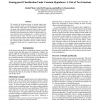Free Online Productivity Tools
i2Speak
i2Symbol
i2OCR
iTex2Img
iWeb2Print
iWeb2Shot
i2Type
iPdf2Split
iPdf2Merge
i2Bopomofo
i2Arabic
i2Style
i2Image
i2PDF
iLatex2Rtf
Sci2ools
AAAI
2008
2008
Strategyproof Classification under Constant Hypotheses: A Tale of Two Functions
We consider the following setting: a decision maker must make a decision based on reported data points with binary labels. Subsets of data points are controlled by different selfish agents, which might misreport the labels in order to sway the decision in their favor. We design mechanisms (both deterministic and randomized) that reach an approximately optimal decision and are strategyproof, i.e., agents are best off when they tell the truth. We then recast our results into a classical machine learning classification framework, where the decision maker must make a decision (choose between the constant positive hypothesis and the constant negative hypothesis) based only on a sampled subset of the agents' points.
| Added | 02 Oct 2010 |
| Updated | 02 Oct 2010 |
| Type | Conference |
| Year | 2008 |
| Where | AAAI |
| Authors | Reshef Meir, Ariel D. Procaccia, Jeffrey S. Rosenschein |
Comments (0)

